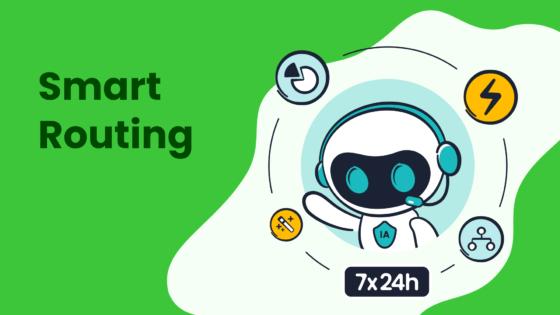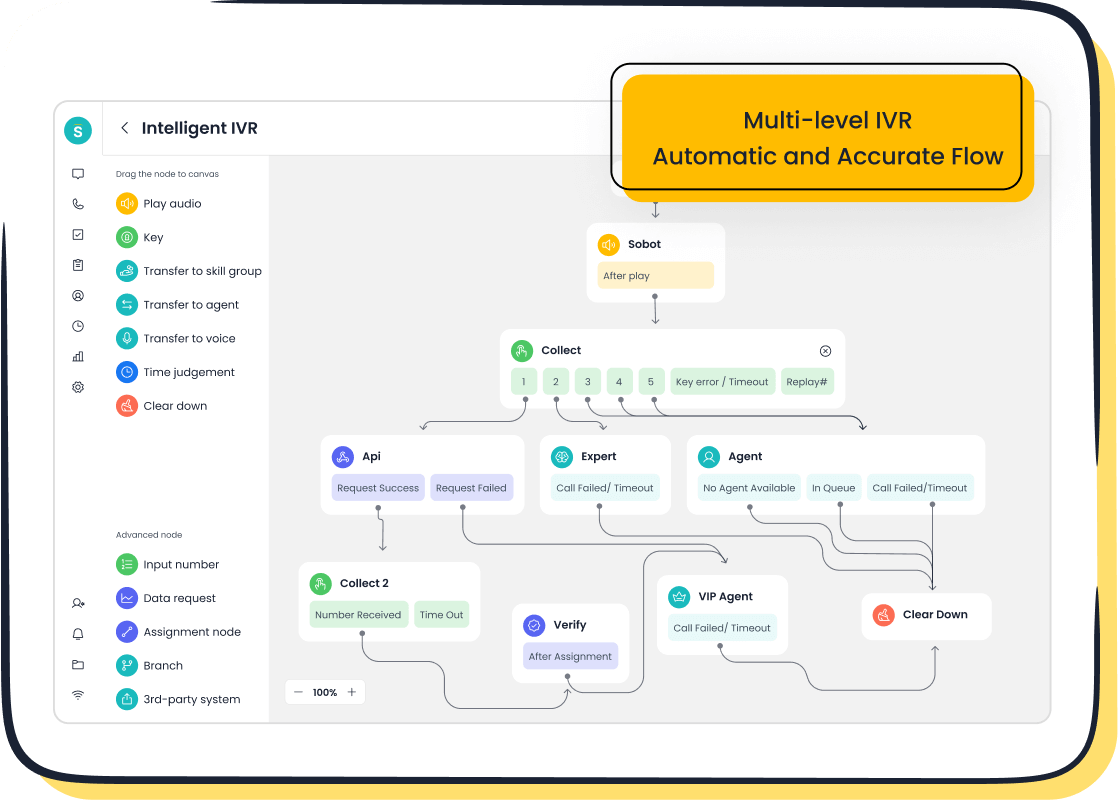Call Center Training Methods to Watch for the Future

Adopting innovative call center training methods is essential for success in the future. Industry research shows:
- 91% of learning and development professionals see soft skills as critical in call center training methods.
- Ongoing training and supportive environments help agents solve complex problems and build strong customer relationships.
- Engaged, well-trained agents stay longer and resolve issues more effectively.
Future-focused contact center training blends advanced technology with continuous learning. Sobot AI and Sobot call center solutions support these training methodologies, driving better customer experience and preparing teams for the future.
Call Center Trends 2025

Industry Shifts
Call center trends for 2025 reveal a landscape shaped by rapid change and innovation. Companies now focus on digital-first strategies to improve customer experience and streamline call center operations. The shift to remote work continues, with many contact centers adopting hybrid models. This approach increases agent productivity and happiness, reduces costs, and allows businesses to access a global talent pool. Omnichannel support has become essential, as customers expect seamless service across phone, chat, email, SMS, and social media. Companies also prioritize cx self-service, expanding self-service options to meet rising customer expectations.
Key industry shifts include:
- Hybrid and remote workforces driving flexibility and business continuity.
- Digital omnichannel support enabling consistent customer and employee experiences.
- Increased investment in automation tools and AI to handle routine tasks.
- Data-driven call center training methods that personalize learning and improve agent performance.
- Enhanced security policies to address new risks in remote operations.
Note: Remote work models now cover up to 44% of U.S. contact center employees, improving both job satisfaction and disaster preparedness.
Technology Drivers
Technology drives the future of contact center trends. Companies rely on advanced contact center technology to deliver better customer experience trends and support digital transformation. The following table highlights key technologies shaping call center training methods in 2025:
| Technology | Application in 2025 Call Center Training |
|---|---|
| Virtual Reality (VR) | Immersive scenario-based training for handling complex issues and soft skills coaching. |
| Artificial Intelligence (AI) | Personalized training, real-time feedback, and automation of repetitive tasks. |
| E-learning Platforms | Flexible, self-paced modules with gamification and progress tracking. |
| Learning Management Systems (LMS) | Centralized content, analytics, and mobile access for ongoing upskilling. |
Sobot stands out as an innovator in the contact center space. Its all-in-one solutions integrate AI, automation, and omnichannel support, helping organizations adapt to evolving customer and employee experiences. Sobot’s cloud-based platform supports remote operations, advanced analytics, and cx self-service, making it a leader in digital-first call center trends.
AI Coaching in Contact Center Training

Real-Time Feedback
AI coaching has transformed contact center training by providing agents with immediate, actionable feedback. This approach uses artificial intelligence to analyze every customer interaction, not just a random sample. As a result, agents receive consistent and personalized guidance that helps them improve key skills such as empathy, compliance, and upselling.
- Top agents who receive effective coaching perform 60% better than average performers.
- AI-driven coaching analyzes 100% of interactions, ensuring no learning opportunity is missed.
- Real-time feedback allows agents to adjust their approach during calls, leading to better customer engagement and satisfaction.
- Automated call evaluations save time and resources, while capturing trends for data-driven training decisions.
- AI coaching nearly doubles agent retention, reducing costly turnover in contact centers.
AI-driven training optimization uses real-time analytics to personalize learning modules based on each agent’s performance. Immediate feedback on strengths and weaknesses reinforces learning and motivates agents to improve. Interactive AI simulations provide realistic scenarios, increasing engagement and skill retention. With 24/7 automated support, agents can access training resources and feedback anytime, supporting continuous, self-paced learning. Real-time sentiment analysis detects customer emotions, allowing agents to adjust their communication style on the fly and enhance the support experience.
Sobot Voice/Call Center AI

Sobot’s Voice/Call Center AI stands at the forefront of contact center technology, offering advanced automation and real-time monitoring features. The AI-powered Voicebot interacts intelligently with customers, recognizing intent and providing accurate responses. This automation tool handles routine inquiries, freeing agents to focus on complex issues and improving overall efficiency.
Sobot’s unified workspace enables supervisors to monitor live call transcriptions and analyze call data instantly. Automated call scoring evaluates agents on key performance indicators such as resolution, sentiment, and empathy, ensuring unbiased quality assurance. AI-generated call summaries reduce post-call wrap-up time, increasing agent productivity and allowing more focus on customer engagement.
Sobot’s platform adapts training content dynamically, ensuring relevance and efficiency in onboarding and ongoing skill development. By integrating automation and artificial intelligence, Sobot helps organizations deliver scalable, personalized coaching that aligns with the latest contact center trends. This approach boosts agent engagement, improves customer satisfaction, and drives operational efficiency.
Tip: Companies using Sobot’s AI implementation report faster call handling times, higher customer satisfaction scores, and improved agent retention. Explore more about Sobot’s Voice/Call Center AI at Sobot Voice.
Blended and Remote Training Methods
Hybrid Learning Models
Contact center training has evolved with the rise of blended, remote, and hybrid learning models. These approaches combine in-person instruction, virtual training, and self-paced modules to meet the needs of a modern, digital-first workforce. Hybrid learning models allow agents to participate in both classroom and remote work environments, increasing flexibility and engagement.
Research from Stanford University shows that call center employees working from home increased performance by 13%, handling more calls per minute and taking fewer breaks. Hybrid models also reduce employee attrition by up to 50%, as flexible work arrangements improve retention and productivity. Foundever reports that hybrid contact center models lower absenteeism rates and foster a sense of community, even when agents work remotely. Surveys indicate that 76% of employees working remotely at least 10% of the time report better work-life balance, while 61% experience less burnout and 52% see higher productivity. These results demonstrate that hybrid and virtual training programs support agent well-being and operational efficiency.
Well-designed training programs prepare 58% more employees for future roles and can lead to up to 20% higher customer satisfaction scores.
Sobot Cloud Platform
Sobot Cloud Platform delivers a scalable and flexible solution for contact center training. The platform offers quick deployment with an out-of-the-box setup and no-code configuration, making it easy to launch new training programs without extensive technical resources. Sobot supports seamless integration with existing systems through powerful APIs, connecting multiple channels and enabling comprehensive virtual training scenarios.
The platform incorporates advanced AI tools, such as AI Agent and AI Copilot, to enhance training efficiency and operational productivity. Omnichannel support covers social media, e-commerce, apps, email, and SMS, allowing agents to practice real-world customer interactions. Sobot provides over 300 statistical reports and extensive data analytics, giving managers deep insights into training effectiveness and agent performance.
Remote training with Sobot offers several measurable benefits:
- Flexible scheduling reduces commuting and minimizes disruption.
- Digital tools enable faster creation and deployment of course materials.
- Training is highly scalable, supporting easy onboarding of new agents.
- Environmentally friendly by reducing travel-related emissions.
- Success can be measured through tests, surveys, discussions, and ROI models.
Employees with comprehensive training handle calls 14% faster and companies investing in training see 53% lower turnover. Sobot’s cloud-based platform supports remote operations, ensuring agents can access virtual training and resources from anywhere. This approach helps organizations build resilient, high-performing teams ready for the future of contact center training.
Gamification and Scenario-Based Learning
Engagement Strategies
Gamification has become a powerful tool in call center training. Companies use game-like elements such as points, leaderboards, and rewards to make learning more engaging. This approach transforms routine tasks into exciting challenges, motivating agents to participate and excel. Research shows that gamification leads to an 89% increase in productivity and an 88% boost in employee happiness. Companies that use gamified training often see up to seven times higher profits.
83% of employees feel more motivated during gamified training, and 48% report higher engagement. Gamification also increases knowledge retention by 30%.
Many leading organizations use gamification to drive participation in coaching, quality assurance, and recognition programs. Techniques like virtual badges, interactive modules, and real-time feedback encourage healthy competition and recognize achievements. These strategies help agents stay focused, motivated, and eager to improve their skills.
Real-World Scenarios
Scenario-based learning brings real customer situations into the training environment. Agents practice handling complex issues through role-playing and guided simulations. This method bridges the gap between theory and practice, allowing agents to build confidence and learn from mistakes in a safe setting.
- Scenario-based training immerses agents in realistic interactions, improving communication, empathy, and decision-making.
- It creates memorable learning experiences and helps agents retain information longer.
- Agents develop stronger problem-solving skills and become better prepared for real calls.
Organizations like Dale Carnegie Training and Disney Institute use scenario-based learning to develop exceptional customer service skills. Sobot’s omnichannel support platform enables trainers to design interactive scenarios across multiple channels, helping agents practice and master skills for phone, chat, email, and social media. This approach leads to faster, more accurate service and higher customer satisfaction.
Scenario-based learning motivates agents by making training relevant and continuous, supporting effective application of skills on the job.
Microlearning and Self-Paced Modules
Short-Form Content
Microlearning has become a cornerstone of modern call center training programs. Companies now deliver short, focused modules that fit into agents’ busy schedules. These sessions usually last between three and ten minutes, targeting specific skills or updates. For example, Verizon uses microlearning modules to keep agents informed about frequent product changes. TD Bank saw a 30% increase in compliance training completion rates after adopting this approach. HubSpot’s customer service team relies on microlearning for ongoing skill development, which leads to steady performance improvements.
Microlearning modules help agents retain knowledge, reduce cognitive overload, and access training anytime. This flexibility supports fast-paced environments and ensures agents stay current.
A culture of continuous learning, supported by regular content updates and feedback channels, helps agents apply new knowledge effectively. Gamification elements, such as points and badges, can boost engagement with learning materials. Knowledge management systems also play a key role. They allow agents to access real-time information, which improves confidence and job satisfaction. Microlearning combats the forgetting curve by reinforcing knowledge in manageable segments, making it easier for new hires to build skills quickly.
Personalized Paths
Personalized learning paths transform the traditional training program into a tailored experience. Managers and agents can collaborate to create learning plans that focus on soft skills, compliance, or technical training relevant to each role. Skills assessments help identify knowledge gaps, allowing the program to target precise needs. Mapping content to career paths motivates agents and aligns learning with progression opportunities.
Personalized paths improve outcomes by letting agents focus on their unique skill gaps. This approach fosters motivation, engagement, and innovation.
Microlearning modules break down content into manageable pieces, making it easy to integrate into daily routines. Regular feedback and reflection opportunities help agents adjust their learning journey. Offering equivalent learning pathways accommodates different learning styles, which increases engagement and retention. Companies like American Express and Hilton Hotels have seen success with blended learning, combining self-paced modules with instructor-led sessions.
Sobot’s cloud-based platform supports microlearning and personalized paths by providing flexible, on-demand access to training resources. The platform’s analytics help managers track progress and adjust training programs for maximum impact. This ensures every agent receives the right support at the right time, driving better performance and satisfaction.
Security and Compliance in Future Training
Data Privacy
Call center training methods must prioritize data privacy as customer expectations and regulations grow stricter. Agents handle sensitive information every day, so organizations need to ensure robust protection. Companies train employees rigorously, focusing on secure data handling and privacy awareness. They review data collection practices and require proper consent management for every interaction.
Key practices for data privacy in call center training include:
- Regular employee training on data handling and privacy laws.
- Clear understanding of regulations such as GDPR, HIPAA, TCPA, and CCPA.
- Strong data security measures like encryption and access controls.
- Transparent communication of privacy policies to customers.
- Respect for customer rights to access, correct, or delete their data.
- Incident response plans for potential data breaches.
- Regular audits and updates to data policies.
Note: Organizations that update their data privacy training regularly reduce the risk of breaches and maintain customer trust. According to IBM, the average cost of a data breach reached $4.45 million in 2023.
Sobot’s cloud-based contact center solutions support secure data transfer and encrypted communications. The platform offers access controls and compliance tools, helping businesses meet global privacy standards while delivering seamless customer experiences.
Regulatory Updates
Regulatory changes shape the future of call center training methods. In 2025, new rules increase oversight and require agile compliance programs, especially in financial services. Companies must update training content often to keep agents informed about evolving laws.
Recent updates, including GDPR, HIPAA, PCI DSS, and CCPA, add complexity to compliance training. Organizations use AI and automation to monitor calls, flag violations, and ensure agents follow compliant scripts. Encryption and secure data handling are now standard requirements.
- Ongoing training sessions keep employees updated on regulations.
- Role-playing and quizzes reinforce learning and compliance.
- Automated quality management tools help monitor agent behavior.
- Regular audits and reporting ensure programs stay effective.
Sobot’s omnichannel platform leverages AI to support compliance monitoring and risk detection. The system helps organizations adapt quickly to regulatory changes, reducing legal and reputational risks. By integrating security and compliance into call center training methods, companies protect both their customers and their brand reputation.
Measuring Call Center Training Methods
Key Metrics
Successful call center training methods rely on clear, measurable outcomes. Leaders track specific metrics to understand how training impacts both agents and customers. These key metrics help organizations identify strengths and areas for growth:
- First-Call Resolution (FCR): Measures how often agents solve customer issues on the first contact. High FCR rates show that training helps agents resolve problems quickly.
- Customer Satisfaction Score (CSAT): Reflects how happy customers feel after an interaction. A higher CSAT means training improves service quality.
- Average Handle Time (AHT): Tracks how long agents spend on each call. Lower AHT, paired with high quality, signals efficient training.
- Call Quality Scores: Evaluates agent performance and adherence to company standards.
- Employee Satisfaction: Shows how training affects agent morale and retention.
- Other Metrics: Abandonment Rate, Average Speed of Answer (ASA), and Net Promoter Score (NPS) provide deeper insights.
Tip: Setting SMART goals for these metrics ensures that call center training methods stay focused and effective. Sobot’s AI-powered analytics help managers monitor these KPIs in real time, making it easier to adjust training and recognize achievements.
Continuous Improvement
Continuous improvement keeps call center training methods relevant and effective. Organizations use a structured approach to refine their programs and boost results:
- Define clear objectives that align with business goals, such as faster response times or higher customer satisfaction.
- Develop training programs tailored to agent needs, including both technical and soft skills.
- Regularly review performance metrics to spot trends and improvement areas.
- Encourage open communication so agents can share feedback and suggest changes.
- Update training content based on real customer feedback and new regulations.
- Use a mix of workshops, e-learning, and role-playing to keep training fresh.
- Foster a culture of learning by providing ongoing coaching and mentorship.
Sobot’s unified platform supports this process by offering real-time dashboards and centralized performance data. Managers can quickly identify gaps, deliver targeted coaching, and adapt training to meet evolving needs. This approach ensures that teams continue to grow and deliver excellent customer experiences.
Sobot Success Story: Agilent
Efficiency Gains
Agilent, a global leader in life sciences and diagnostics, faced challenges with high volumes of customer inquiries. The company needed a solution to improve efficiency in its call center operations. Agilent chose Sobot’s omnichannel platform to address these needs. Sobot provided an AI-powered chatbot and a unified workspace for agents. This technology allowed Agilent to automate routine questions and direct complex issues to skilled agents.
After implementing Sobot, Agilent saw a sixfold increase in service efficiency. The AI chatbot handled common requests around the clock. Human agents focused on more difficult problems. Sobot’s intelligent routing system sent each inquiry to the right team. This reduced wait times and improved first-contact resolution. Managers used Sobot’s analytics to monitor performance and adjust training programs. The platform’s seamless integration with Agilent’s website and social media unified all customer and employee experiences.
Fact: Agilent reduced operational costs by 25% after using Sobot’s solutions. The company also improved agent productivity and response speed.
Customer Satisfaction
Customer satisfaction became a top priority for Agilent. Sobot’s platform helped the company deliver a consistent customer experience across every channel. The AI chatbot provided fast answers, while agents offered personalized support for complex cases. Customers received help through their preferred channels, including chat, email, and phone.
Agilent achieved a customer satisfaction score of 95% after adopting Sobot. The unified workspace made it easy for agents to access customer history and provide accurate information. Sobot’s tools supported ongoing training, which improved both customer and employee experiences. The company’s ability to resolve issues quickly led to higher loyalty and positive feedback.
Note: Agilent’s story shows how advanced contact center training and technology can transform customer experience and drive measurable results. Learn more about Agilent’s journey with Sobot here.
Adopting future-ready call center training methods helps organizations boost agent performance, improve customer satisfaction, and ensure compliance. Sobot’s cloud-based solutions support continuous learning, real-time feedback, and secure operations. Companies that embrace these trends see higher ROI and stronger brand value.
- Use hands-on practice, gamification, and AI-driven analytics to prepare teams for the future.
- Regularly review training strategies to meet evolving customer needs and future industry demands.
- Sobot empowers organizations to stay ahead in the future of customer service.
FAQ
What are the most effective call center training methods for 2025?
Experts recommend blended learning, AI coaching, and scenario-based practice. These call center training methods help agents build real skills. Sobot’s cloud platform supports these approaches, making training flexible and measurable. Companies using modern methods see up to 20% higher customer satisfaction.
How does Sobot support remote contact center training?
Sobot offers a cloud-based solution that enables remote onboarding, live coaching, and self-paced modules. Agents access training from any device. Managers track progress with real-time analytics. This approach increases agent retention and supports business continuity in global contact centers.
Why is data privacy important in call center training methods?
Agents handle sensitive customer data daily. Training on privacy laws like GDPR and CCPA protects both customers and companies. Sobot’s encrypted communications and compliance tools help organizations meet strict standards. Regular privacy training reduces the risk of costly data breaches.
How can companies measure the success of contact center training?
Leaders track metrics such as First-Call Resolution, Customer Satisfaction Score, and Average Handle Time. Sobot’s analytics dashboard provides real-time insights. Companies that monitor these KPIs improve agent performance and deliver better customer experiences.
What makes Sobot’s call center training solutions unique?
Sobot combines AI-powered coaching, omnichannel support, and real-time analytics in one platform. The system adapts to each agent’s needs. Sobot’s solutions help organizations implement future-ready call center training methods and achieve measurable results in efficiency and customer satisfaction.
For more details on Sobot’s contact center training solutions, visit Sobot’s official website.
